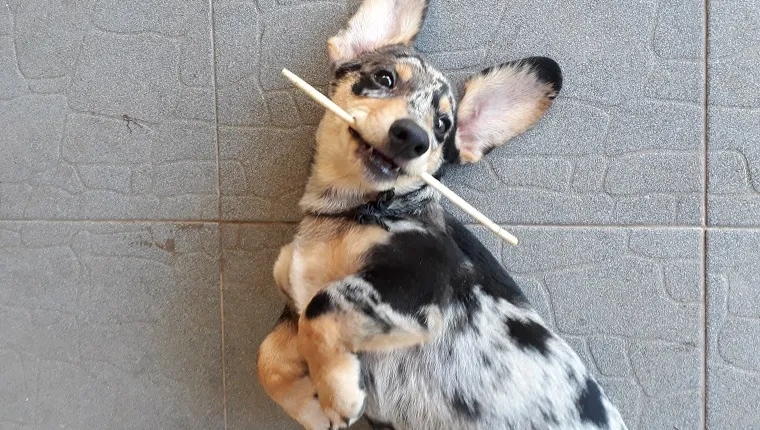Welcome to our comprehensive guide on the Dorgi, a delightful mix of Dachshund and Corgi known for its adorable appearance and playful personality. Whether you’re curious about this unique crossbreed or considering adopting one into your family, join us as we explore everything from their origins and distinctive characteristics to their care, training tips, and health considerations. Get ready to fall in love with the lovable Dorgi!
Origins and History
The Royal Connection
The Dorgi gained fame through its association with the British royal family, particularly Queen Elizabeth II, who has owned several Dorgis over the years. These charming hybrids are a cross between the Dachshund, known for its elongated body and short legs, and the Corgi, renowned for its royal lineage and endearing personality.
Purposeful Crossbreeding
Like many designer breeds, the Dorgi was intentionally bred to combine the best traits of its parent breeds. From the Dachshund, they inherit a spirited nature and keen sense of smell, while the Corgi contributes intelligence, loyalty, and that distinctive “big dog in a small body” attitude.
Physical Characteristics
Adorable Appearance
Dorgis typically exhibit a blend of traits from both Dachshunds and Corgis. They have a compact body with short legs, a long torso, and often sport a mix of colors and patterns found in both parent breeds. Their expressive eyes and perky ears add to their undeniable charm.
Coat and Colors
The Dorgi’s coat can vary depending on the genetic influence of their Dachshund and Corgi parents. They may have a short to medium-length coat that requires moderate grooming to keep it looking neat and healthy. Common coat colors include shades of red, black, tan, and combinations thereof.
Temperament and Behavior
Playful and Affectionate
Dorgis are known for their playful and affectionate nature, making them excellent companions for families and individuals alike. They thrive on attention and enjoy participating in activities with their owners, whether it’s playing fetch or cuddling on the couch.
Intelligence and Trainability
With their intelligent and eager-to-please nature, Dorgis are generally quick learners when it comes to training. Positive reinforcement techniques such as treats and praise work best, as they respond well to encouragement and consistency. Early socialization helps them develop good manners and adaptability to various environments.
Health and Wellness
Potential Health Considerations
While generally healthy, Dorgis may inherit certain health conditions from their parent breeds. These can include:
- Intervertebral Disc Disease (IVDD): A spinal condition common in Dachshunds due to their elongated backs, which can lead to back pain and mobility issues.
- Hip Dysplasia: A genetic condition affecting the hip joints’ function, potentially causing discomfort and arthritis.
- Obesity: Due to their small stature, Dorgis are prone to weight gain if not provided with a balanced diet and regular exercise.
Routine veterinary check-ups, a healthy diet, and maintaining a suitable weight are essential for promoting their overall health and longevity.
Dietary Needs
Feeding a Dorgi should be based on their size, age, activity level, and individual health needs. High-quality dog food that provides essential nutrients and supports joint health is recommended. Avoid overfeeding and monitor their weight to prevent obesity, which can exacerbate health issues.
Care and Grooming
Exercise Requirements
Dorgis have moderate exercise needs and enjoy daily walks, playtime, and interactive toys to keep them mentally stimulated. They benefit from activities that challenge their intellect and encourage physical activity, which helps maintain their overall well-being.
Grooming Tips
Maintaining a Dorgi’s coat is relatively simple, requiring regular brushing to remove loose hair and prevent matting. Occasional baths are necessary to keep their coat clean and odor-free. Pay attention to their ears, teeth, and nails as part of their grooming routine to ensure they remain healthy and comfortable.
Living with a Dorgi
Training Insights
Start training your Dorgi early to establish good behaviors and prevent undesirable habits. Use positive reinforcement techniques and patience to reinforce desired behaviors while discouraging negative ones. Their playful nature and intelligence make training sessions enjoyable and rewarding for both owner and dog.
Family Compatibility
Dorgis are affectionate and enjoy being part of a family environment where they receive love and attention. They get along well with children and other pets when socialized from a young age, although supervision is recommended due to their small size and potential for injury during rough play.
Conclusion
The Dorgi is a delightful blend of Dachshund spunk and Corgi charm, offering companionship and joy to anyone lucky enough to share their home. Whether you’re drawn to their royal lineage or their adorable appearance, owning a Dorgi promises a life filled with laughter and love. Remember, responsible ownership includes providing proper care, training, and veterinary attention to ensure a fulfilling life for your Dorgi companion.
- Best Clay Alternatives for 2025 - April 19, 2025
- Best Seamless.ai Alternatives for 2025 - April 19, 2025
- Best UpLead Alternatives for 2025 - April 18, 2025



